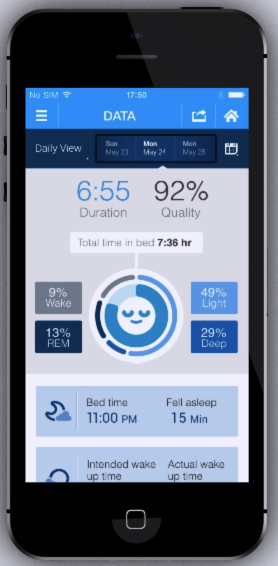Americans are exhausted. Our insomnia has gotten so bad that the CDC recently declared it a public health epidemic.
SleepRate released a heart rate monitor and mobile app today built on patented sleep analysis algorithms that emerged out of the sleep clinic at Stanford’s School of Medicine. The company claims SleepRate has seen an 85% success rate in studies.
“Short term sleep issues affect work and day-to-day activities, while chronic insomnia may lead to a surge in serious health problems such as coronary heart disease, stroke, diabetes, obesity, and/or injury from accidents,” said SleepRate’s founder, Dr. Anda Baharav. “Physicians focus on detecting medical causes of poor sleep, yet this disregards psycho-physiological and environmental issues that compromise sleep and account for as much as 85% of all cases. SleepRate uncovers all three causes and deals with the last two — psycho-physiological and environmental sleep disruptors.”
 SleepRate is based on “Cognitive Behavioral Therapy for Insomnia” (CTBI), which it exclusively licensed from Stanford. This approach identifies the root cause of your poor sleep by analyzing your heart rate over the course of five nights.
SleepRate is based on “Cognitive Behavioral Therapy for Insomnia” (CTBI), which it exclusively licensed from Stanford. This approach identifies the root cause of your poor sleep by analyzing your heart rate over the course of five nights.
Using the $99 heart rate monitor and app, SleepRate tracks your sleep and automatically provides daily reports of your “sleep structure” with information about overall sleep quality, sleep onset, total time in bed, total sleep time, stress levels, arousals, awakenings, sleep stages, environmental disturbances, and snoring.
The app will also wake you up with an alarm at the “optimal” time based on your heart rate monitor, although this may not go over well with your boss if that time is 2 in the afternoon.
SleepRate then uses all this data to create a personalized sleep improvement plan, making recommendations that could help you fall asleep more easily and stay asleep. These “sleep goals” could include waking up at the same time every day and “conditioning” the connection of bed with sleep (meaning don’t work in bed).
Nearly half of the American population experiences insomnia and one-third doesn’t get enough sleep to function at peak levels. Exhaustion is linked to motor vehicle crashes, industrial disasters, and medical and other occupational errors, and costs an estimated $63.2 billion in lost productivity a year.
SleepRate’s CEO Uli Gal-Oz said that sleep may be treated as a “luxury” in today’s fast-paced, connected world, but it is critical for health and well-being. However, only two percent of people struggling with sleeping issues get treated.
Prescription medicine is a common way to treat sleep disorders, but many doctors don’t recommend sleeping pills because they create dependency, have side effects, and don’t address the underlying issues of insomnia.
Cognitive behavioral therapy has been found to be just as effective as prescription meds, and the National Institute of Health recommends it as the “first line” and “long-term” strategy. The challenge is that CBTI was historically difficult to deliver due to a lack of trained clinicians — until smartphones hit the scene.
Mobile technology has opened up a new world of possibilities for insomnia treatment, and along with the rise of the quantified self movement, a number of apps and gadgets have emerged designed to help us sleep better.
Azumio’s SleepTime app is an alarm clock that monitors and analyzes your sleep cycles and wakes you up in the lightest sleep phase. And there’s a host of other competing offerings on the market. Popular health gadget maker Withings recently unveiled a new sleep-tracking gadget called Withings Aura, the Basis Science smart watch provides sleep analytics, Beddit is an ultra-thin sensor that goes under your bedsheets and collects sleep data, Lark is a wristband that helps you and your bedmate sleep well together, and Napwell is a “smart” sleep mask designed for the perfect power nap.
Dr. Baharav has spent 20 years in sleep medicine, most recently as a researcher at the Medical Physics Department at Tel Aviv University. SleepRate operates out of Palo Alto, Calif., and Petah Tikva, Israel. The app is available on the iPhone 4S and above and the iPad.
VentureBeat's mission is to be a digital town square for technical decision-makers to gain knowledge about transformative enterprise technology and transact. Learn More

